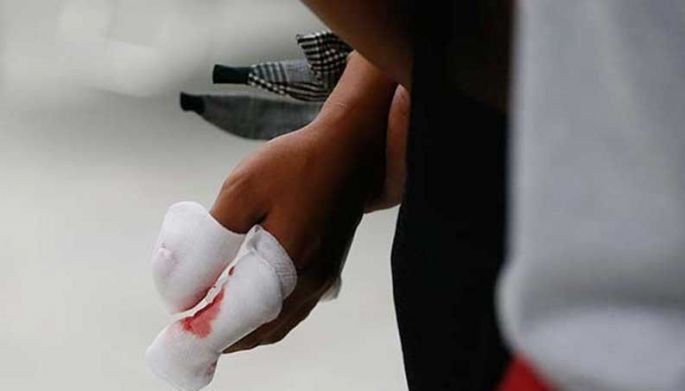Traffic accidents kill 11 Filipino children every hour — study
April 13, 2005 | 12:00am
Streets and sidewalks could well be minefields for Filipino children.
A study conducted by Safe Kids Worldwide, an international non-profit organization, and Federal Express showed 11 children are killed every hour in traffic-related accidents.
Four of the 11 deaths involved child pedestrians or children just walking on the road, the study also showed.
The study, which was released to the media yesterday, was intended to assess and raise awareness about the risks that children face on the road, either as pedestrians or as passengers in motor vehicles.
Dr. Rafael Consunji, director for Asia Operations of Safe Kids, believes the risk factors for road accidents in the Philippines are increasing.
The volume of vehicles per capita has doubled in the country in the past 12 years, Consunji, a trauma surgeon at the Philippine General Hospital, explained.
During the period, the deaths of children in traffic accidents increased 130 percent.
"Since you woke up this morning or maybe for the past three hours, 33 children have died because of accidents, while 100 others have been hospitalized and 300 more suffered minor injuries," Consunji said.
The statistics are "unacceptable" to Consunji.
"Most of them are healthy kids. Many years of life are ahead of them to be productive citizens of this country," he said.
To assess the traffic environment in the Philippines, Safe Kids and FedEx have performed child "walkability checks" in various elementary schools in Parañaque City and Pasay City.
The study projected that only 14,500 of the 58,000 public school students in the two cities are accompanied by adults in walking to and from school.
Consunji warned that children are especially prone as pedestrians to accidents because their cognitive, development, behavioral, physical and sensory abilities are not yet fully developed.
"Aside from this they are so small, and sometimes they could not be seen from the driver’s seat," he said.
The study also found that sidewalks were missing from the paths most children take to school. If there are sidewalks, the path is quite often like an "obstacle course" because of the presence of parked vehicles, garbage, vendors’ stalls and open manholes.
Consunji noted the Philippines is "far behind" neighboring countries in Asia in the promotion of child pedestrian safety.
"In China, 44 percent of children encountered serious hazards on their routes to school, and 60 percent had problems crossing streets. In the Philippines, 70 percent of children encountered sidewalk obstructions, 52 percent did not have adequate sidewalks surrounding their schools and 29 percent did not have any sidewalks on the way to school," the study said.
Consunji said addressing the problem of child safety requires a combination of discipline, law enforcement and good road engineering.
But he believes the Philippines can yet make neighborhoods and school zones safe if it starts adopting a "multi-faceted" approach to the problem.
A study conducted by Safe Kids Worldwide, an international non-profit organization, and Federal Express showed 11 children are killed every hour in traffic-related accidents.
Four of the 11 deaths involved child pedestrians or children just walking on the road, the study also showed.
The study, which was released to the media yesterday, was intended to assess and raise awareness about the risks that children face on the road, either as pedestrians or as passengers in motor vehicles.
Dr. Rafael Consunji, director for Asia Operations of Safe Kids, believes the risk factors for road accidents in the Philippines are increasing.
The volume of vehicles per capita has doubled in the country in the past 12 years, Consunji, a trauma surgeon at the Philippine General Hospital, explained.
During the period, the deaths of children in traffic accidents increased 130 percent.
"Since you woke up this morning or maybe for the past three hours, 33 children have died because of accidents, while 100 others have been hospitalized and 300 more suffered minor injuries," Consunji said.
The statistics are "unacceptable" to Consunji.
"Most of them are healthy kids. Many years of life are ahead of them to be productive citizens of this country," he said.
To assess the traffic environment in the Philippines, Safe Kids and FedEx have performed child "walkability checks" in various elementary schools in Parañaque City and Pasay City.
The study projected that only 14,500 of the 58,000 public school students in the two cities are accompanied by adults in walking to and from school.
Consunji warned that children are especially prone as pedestrians to accidents because their cognitive, development, behavioral, physical and sensory abilities are not yet fully developed.
"Aside from this they are so small, and sometimes they could not be seen from the driver’s seat," he said.
The study also found that sidewalks were missing from the paths most children take to school. If there are sidewalks, the path is quite often like an "obstacle course" because of the presence of parked vehicles, garbage, vendors’ stalls and open manholes.
Consunji noted the Philippines is "far behind" neighboring countries in Asia in the promotion of child pedestrian safety.
"In China, 44 percent of children encountered serious hazards on their routes to school, and 60 percent had problems crossing streets. In the Philippines, 70 percent of children encountered sidewalk obstructions, 52 percent did not have adequate sidewalks surrounding their schools and 29 percent did not have any sidewalks on the way to school," the study said.
Consunji said addressing the problem of child safety requires a combination of discipline, law enforcement and good road engineering.
But he believes the Philippines can yet make neighborhoods and school zones safe if it starts adopting a "multi-faceted" approach to the problem.
BrandSpace Articles
<
>
- Latest
- Trending
Trending
Latest
Trending
Latest
Recommended






























